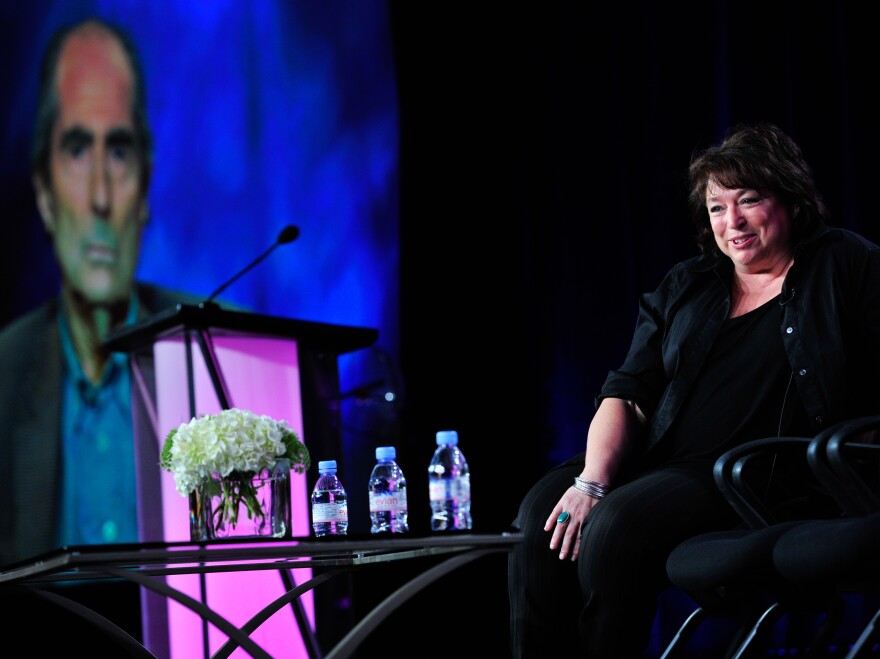There's nothing particularly dynamic about Livia Manera and William Karel's documentary Philip Roth: Unmasked. For some 90 minutes, it's pretty much just one guy talking. But what a guy!
Roth is one of the greatest living novelists, possibly even the greatest. He can also be an inflammatory presence, eliciting outrage almost as much as admiration, particularly among women who see him as a misogynist.
Surprisingly, perhaps, the Roth of Philip Roth: Unmasked is sensible, sensitive, a bit cranky, maybe. He's barely outrageous at all — but he's also inexplicably compelling, occasionally showing off a sense of humor that's half Borscht Belt, half Samuel Beckett.
He tells a story about realizing he hasn't chosen a place for his own burial and going shopping for a grave, perhaps somewhere near that of his parents. He points out a potential site, only to have the sales agent reject it out of hand: "I don't like that for you, Mr. Roth," he says. "There's no legroom."
Even people who haven't read any Philip Roth can probably tell you that he's thought a lot about both death and sex, and perhaps not necessarily in that order. But in Unmasked, he speaks much more about the former. That's probably not surprising, considering Roth is 79.
But it does put the swagger and confidence of some of his best-known novels — from his first big success, 1969's Portnoy's Complaint, to his game-changing midcareer work of 1986, The Counterlife, to 1995's Sabbath's Theater, which, as Roth puts it, is about two "exuberant adulterers" — into a somewhat poignant context.

Like most people, Roth doesn't like getting old, and losing friends is perhaps the most painful part of it. "If you look at your address book," he says, "it's like walking through a cemetery."
Philip Roth: Unmasked — which opens at Film Forum in New York on March 13 and will air on PBS beginning March 29 — covers a lot of territory, beginning with Roth's recollections of growing up in Newark, N.J., followed almost immediately by his assertion that he couldn't wait to leave there forever.
He makes the case, cogently, that although certain elements of his work have been drawn from his own life, his stories are largely un-autobiographical. ("Life isn't good enough in some ways," he says, in defense of the good old-fashioned tradition of making stuff up.)
Early in the film, he notes that he doesn't like being pigeonholed as a Jewish-American writer. "I don't write in Jewish," he says simply. "I write in American."
Roth says nothing in the movie, and isn't asked, about his recent announcement that he has permanently retired from writing fiction. But he does offer some fascinating observations about how writers cannot operate from feelings of shame — which is different, he notes, from feeling shame as a person — and about the joys of writing about people who misbehave sexually.
He also discusses the point, around the time of The Counterlife, at which politics and history began to play a larger role in his work — sex and death, after all, can take you only so far.
Manera and Karel have shaped Philip Roth: Unmasked simply but carefully, keeping the number of talking heads — other than Roth's own — to a minimum. Roth's detractors may very well hate this documentary. There's no one to carp on-camera about his alleged misogyny, his preoccupation with the male ego and other assorted oldies but goodies.
Yet a Philip Roth documentary that doesn't trundle heavily down those tired old avenues is probably all the better for it. Interviewees include superstar novelist Jonathan Franzen and New Yorker staff writer Claudia Roth Pierpont, both of whom are great admirers of Roth's work. But the most persuasive and passionate of all is novelist Nicole Krauss.
"We don't go to literature for moral perfection," she says. "We go there for moral ambiguity, moral feeling, moral struggle."
Roth hands us nothing on a plate; it's the only way, maybe, to give us everything. (Recommended)
Copyright 2021 NPR. To see more, visit https://www.npr.org.


